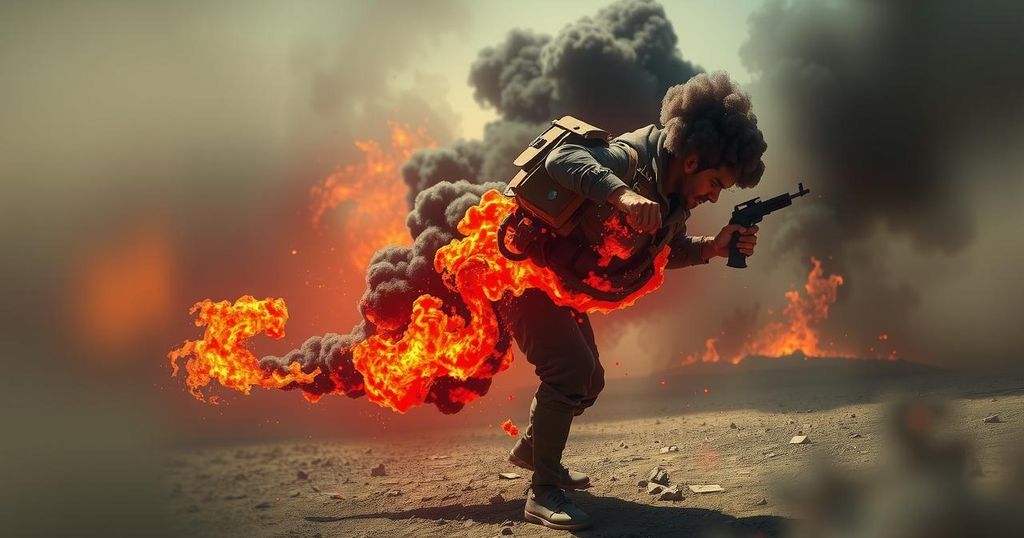The Houthis in Yemen are pursuing a dangerous course of action by launching missile attacks against Israel, seemingly emboldened by Iranian support. This has provoked significant retaliatory strikes from Israel, which underscores the risks involved in this confrontation. The historical context of other Iranian proxies, like Hezbollah, signals potential severe repercussions for the Houthis if they do not reconsider their approach. They must choose between continued aggression and the welfare of their people.
The Houthi movement in Yemen appears to be engaged in a perilous strategy driven by reckless ambition and regional alliances, particularly with Iran. Over the past few weeks, they have reportedly launched at least 15 missiles targeting Israel, specifically the major urban centers of Jerusalem and Tel Aviv. This aggressive posture, seemingly encouraged by Iranian backing, has already elicited a strong response; Israel has subsequently taken action against key Houthi infrastructure, including the Hodeidah Port and Sanaa International Airport.
Despite the evident risks illustrated by the fates of their regional allies, the Houthis remain undeterred in their military ambitions. The likes of Hezbollah and Hamas have faced severe repercussions for their confrontational tactics against Israel. Specifically, Hezbollah’s recent actions have resulted in the assassination of leader Hassan Nasrallah, highlighting the grave consequences of engaging with Israel militarily.
The Houthis have openly claimed responsibility for numerous missile attacks on Israel, an indication of their intention to display military capabilities to their Iranian patrons. However, Iran itself is facing significant internal dissent and economic strife, which calls into question its ability to support proxy groups like the Houthis effectively.
Former Houthi spokespeople have expressed skepticism regarding their alliance with Iran, signifying a possible realization that dependence on such a faltering ally is ill-advised. The response from Israel to the Houthis’ aggression serves as a potent reminder that Israel will not tolerate further provocations and will act decisively to protect its interests.
The impact of continued hostility by the Houthis will further isolate them and inflict detrimental damage on their strategic objectives. However, the Houthis are faced with a crucial choice: either to perpetuate their aggressive stance or to reconsider their tactics and seek diplomatic resolutions for the prolonged conflict in Yemen. If they persist along this dangerous path, the consequences, as history has shown, will be severe and unforgiving.
Ultimately, the Houthis must acknowledge that their actions are akin to playing with fire; failure to alter their course could very well lead to their own undoing. They must contemplate the welfare of the Yemeni populace, who are suffering due to ongoing violence and conflict, and prioritize diplomatic efforts to alleviate the situation in Yemen.
The editorial discusses the recent aggressive actions of the Houthi movement in Yemen, particularly their missile attacks against Israel, and the implications of such actions both regionally and within their domestic context. It highlights the historical context of conflicts in the region, particularly the challenges faced by Iranian proxies like Hezbollah, and how the Houthis might learn from these precedents. Furthermore, it underscores the growing discontent within Iran, which raises questions about the sustainability of support for Houthi operations. This context is crucial for understanding the dynamics at play in Yemen and the broader Middle East.
In summary, the Houthis are navigating a dangerous path through aggressive military actions supported by Iran, which could ultimately lead to significant consequences for their movement. Their alignment with a faltering ally, along with the lessons derived from the experiences of Hezbollah and Hamas, underscores the high stakes involved. As such, the Houthis have an essential decision to make regarding their future actions; failure to change course could result in their own destruction. It remains to be seen whether they will prioritize the needs of the Yemeni people and pursue a diplomatic resolution over continued aggression.
Original Source: www.jpost.com






